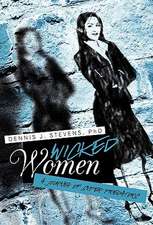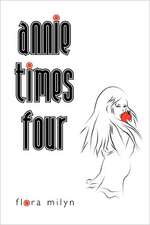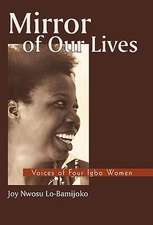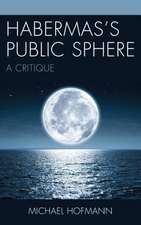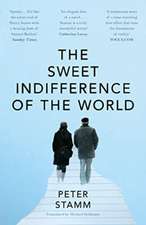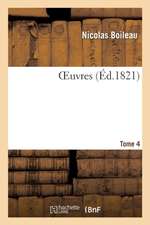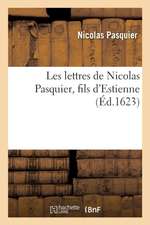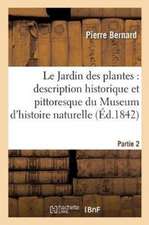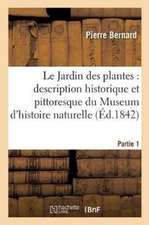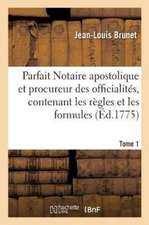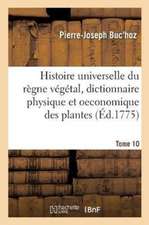Frost
Autor Thomas Bernhard Traducere de Michael Hofmannen Limba Engleză Paperback – 31 dec 2007
Visceral, raw, singular, and unforgettable, Frost is the story of a friendship between a young man beginning his medical career and a painter in his final days. The youth has accepted an unusual assignment, to travel to a miserable mining town in the middle of nowhere in order to clinically—and secretly—observe and report on his mentor’s reclusive brother, the painter Strauch. Carefully disguising himself as a law student with a love of Henry James, he befriends the aging artist and attempts to carry out his mission, only to find himself caught up in his subject’s apparent madness.
Preț: 118.21 lei
Nou
Puncte Express: 177
Preț estimativ în valută:
22.62€ • 23.53$ • 18.68£
22.62€ • 23.53$ • 18.68£
Carte disponibilă
Livrare economică 22 martie-05 aprilie
Preluare comenzi: 021 569.72.76
Specificații
ISBN-13: 9781400033515
ISBN-10: 1400033519
Pagini: 341
Dimensiuni: 136 x 201 x 18 mm
Greutate: 0.26 kg
Editura: Vintage Books USA
ISBN-10: 1400033519
Pagini: 341
Dimensiuni: 136 x 201 x 18 mm
Greutate: 0.26 kg
Editura: Vintage Books USA
Notă biografică
Thomas Bernhard was born in Holland in 1931 and grew up in Austria. His interest in music and theater led him to study at the Akademie Mozarteum in Salzburg. He published nine novels, an autobiography, one volume of poetry, four collections of short stories, and six volumes of plays. He died in Austria in 1989.
Extras
First DayA medical internship consists of more than spectating at complicated bowel operations, cutting open stomach linings, bracketing off lungs, and sawing off feet; and it doesn't just consist of thumbing closed the eyes of the dead, and hauling babies out into the world either. An internship is not just tossing limbs and parts of limbs over your shoulder into an enamel bucket. Nor does it just consist of trotting along behind the registrar and the assistant and the assistant's assistant, a sort of tail-end Charlie. Nor can an internship be only the putting out of false information; it isn't just saying: "The pus will dissolve in your bloodstream, and you'll soon be restored to perfect health." Or a hundred other such lies. Not just: "It'll get better"—when nothing will. An internship isn't just an academy of scissors and thread, of tying off and pulling through. An internship extends to circumstances and possibilities that have nothing to do with the flesh. My mission to observe the painter Strauch compels me to think about precisely such non-flesh-related circumstances and issues. The exploration of something unfathomably mysterious. The making of sometimes very far-reaching discoveries. The way you might investigate a conspiracy, say. And it is perfectly possible that the non-flesh-related, by which I don't mean the soul—that what is non-flesh-related, without being the soul, of which I can't say for certain whether it exists, though I must say I assume it does, that this thousand-year-old working assumption is a thousand-year-old truth—but it is perfectly possible that the non-flesh-related, which is to say, the non-cell-based, is the thing from which everything takes its being, and not the other way round, nor yet some sort of interdependence. Second Day I took the earliest train at four thirty. Passed through sheer rock. When I boarded the train, I was shivering. Gradually I warmed up. Further, the voices of the workers coming home off the night shift. I felt for them right away. Men and women, old and young, but all with the same voices of utter exhaustion, from their heads and their breasts and their balls down to their boot soles. The men in gray caps, the women in red headscarves. They wrapped their legs in scraps of loden cloth; that's the only way they know of keeping the cold at bay. I knew at once that they were a group of snow-shovelers who had got on at Sulzau. It felt as warm as in a cow's belly: the air felt as if it was being pumped from body to body with incredible pressure from some collective muscle. Doesn't bear thinking about! I pressed my back hard against the wall of the compartment. Because I hadn't slept all night, I dropped off. When I woke up, I saw again the trail of blood that trickled unevenly along the wet floor of the wagon, like a stream threading its way between mountains, ending up between the window and the window frame, under the emergency brake. It originated from a crushed bird that had been cut in half by a sudden jerk of the window. Maybe days ago. Shut so hard, there wasn't the trace of a draft. The conductor, going by in performance of his dismal duty, had taken no notice of the dead bird. But he must have seen it. I knew that. Suddenly I heard the story of a lineman who had been asphyxiated in a snowstorm, which ended: "He never cared about anything." I don't know if it was my exterior, or something inside me, finding some expression, the aura of my thoughts, of my task, energetically preparing itself in me--but no one sat down near me, even though over time every seat became precious. The train wheezed through the river valley. In my thoughts, I was once briefly at home. Then I was far away again, in some city I once walked through. Then I saw specks of dust on my left sleeve, which I tried to brush off with my right arm. The workers pulled out knives, and cut bread. They choked down great thick lumps of bread, and ate pieces of meat and wurst with them. Great chunks that no one would ever eat at a table. Only on their laps. They all drank ice-cold beer, and were evidently too enfeebled to laugh at themselves, even though they felt they were worth laughing at. They were so tired, it didn't even occur to them to do up their flies or wipe their mouths. I thought: When they get home, they'll fall straight into bed. And at five in the afternoon, when everyone else knocks off, they'll start again. The train rattled and plunged down, like the river running beside it. If anything, it seemed to be getting darker. The room is as small and uncomfortable as my intern's room in Schwarzach. If it's the roar of the river that's unbearable there, here it's the silence. At my request, the landlady took down the curtains. (It's always like that with me: I don't like having curtains in rooms that frighten me.) The landlady is disgusting to me. It's the same disgust I felt when I was a child and had to vomit outside the open doors of the slaughterhouse. If she were dead I would, today, feel no disgust--dead bodies on the dissecting table never remind me of live bodies--but she's alive, and living in a moldy ancient reek of inn kitchens. Apparently she likes me, though, because she lugged my suitcase upstairs, and offered to bring me breakfast in bed every morning, which is absolutely at variance with her normal practice. "The painter's an exception," she said. He was another long-stay guest, and long-stay guests enjoyed certain privileges. Even though, as far as innkeepers were concerned, they were "more trouble than they were worth." How had I happened to wind up at her inn? "By chance," I said. I wanted to recuperate quickly, and return home, where a mountain of work was waiting for me. She seemed understanding. I told her my name and showed her my passport. So far I haven't seen anyone but the landlady, even though I heard a lot of noise in the inn in the interval. At lunchtime, when I stayed in my room, I asked the landlady about the painter, and she said he was in the forest. "He's almost always in the forest," she said. He wouldn't be back before supper. Was I acquainted with the painter? she asked. "No," I said. Silently standing in the doorway, she seemed to pose an urgent question, as woman to man. I was startled, and—without a word, though not without an edge of nausea—refused her offer. Weng is the most dismal place I have ever seen. Far more dismal than in the assistant doctor's description. Doctor Strauch had spoken about it in the sort of veiled terms one might use to describe a dangerous path to a friend who has to go there. The assistant stuck to intimations. He tied me more and more tightly to the task with invisible ropes, creating an unbearable tension between him and me, while I felt the arguments he remorselessly advanced against me like nails being driven into my brain. He did at least manage not to irritate me. Confined himself rigidly to points I had to observe. I really was frightened by this landscape, in particular this one spot, which is populated by small, fully grown people whom one can certainly call cretins. No taller than five feet on average, begotten in drunkenness, they pass in and out through cracks in the walls and corridors. They seem typical of this valley. Weng is at a considerable elevation, but still stuck at the bottom of a gorge. It's impossible to get out up the cliff walls. The only way out is by train. It's so ugly that it's characterful; far prettier landscapes have no character. Everyone there has tipsy children's voices, scraped away to a high C, which they drill into you as you pass by. Jab into you. Jab from the shadows, I have to say, because in truth I have only seen shadows of people so far, human shadows, in poverty and in a dank tremor of frenzy. And those voices, jabbing at me out of the shadows, first of all confused me, and then drove me faster on my way. But these realizations were nonetheless sober ones; they didn't depress me. Actually all I felt was annoyance, because it was all so incredibly inhospitable. On top of everything, I had to lug my cardboard suitcase, with its contents jumbling together. The way up to Weng from the train station, where the industrial park is and where the big power plant is being built, can only be covered on foot. Five kilometers, which can't be shortened in any way, least of all in this season. Barking, howling dogs everywhere. I could imagine people being driven mad in the long run, if they were compelled to experience uninterruptedly the sort of thing I had to experience on the way up to Weng, and in Weng itself, if they weren't distracted by their work or by pleasure or other appropriate activities, as for instance whores, or church, or drinking, or all three at once. What brings a man like the painter Strauch to such a place, and to such a place at such a time, that it must be like a repeated slap in the face? My assignment is highly confidential, and I think it was deliberately entrusted to me suddenly, from one day to the next. The assistant must have spent some time nursing the idea of charging me with the observation of his brother. And why me? Why not one of the others, interns like myself? Because I often came to him with difficult questions, and the others didn't? He specifically told me on no account to arouse the least suspicion in the painter Strauch that there had been any communication between himself, the surgeon Strauch his brother, and myself. That's why I am also to say, if asked, that I am studying law, so as to divert attention from medicine. The assistant paid for my travel and board. He gave me a sum of money that seemed ample to him to cover everything. He demands precise observation of his brother, nothing more. Description of his behavior, of the course of his typical day; information about his opinions, intentions, expressions, judgments. A report on his walk. On his way of gesticulating, flying off the handle, "keeping people at bay." On the way he handled his walking stick. "Watch the way my brother holds his stick, I want a precise description of it." It's twenty years since the surgeon last saw the painter. Twelve years since their last letters. The painter describes the relationship as hostile. "Even so, as a doctor, I will make an effort," said the assistant. For which he needed my help. My observations would be extremely useful to him, more than anything he had yet undertaken. "My brother," he told me, "is unmarried, as I am. He lives, as they say, in his head. But he's terminally confused. Haunted by vice, shame, awe, reproach, examples—my brother is a walker, a man in fear. And a misanthrope." This assignment is a private initiative on the part of the assistant, but I am to view it as part of my apprenticeship in Schwarzach. It's the first time that observation has presented itself to me as work. I had intended to take with me Koltz on diseases of the brain, divided into "hyper-activity" and "lesions" of the brain, but in the end I didn't. Instead I took along a book of Henry James's, which I had started in Schwarzach. At four o'clock I left the inn. In the sudden massive quiet I was seized by a feeling of unease. My sensation—of having put on the room like a straitjacket, and now needing to take it off—made me charge down the stairs. I went into the public bar. When, after several shouts, no one came, I went outside. I stumbled over a chunk of ice, picked myself up, and found an objective: a tree stump some twenty yards away. There I stopped. Now I could see lots of similar stumps sticking out of the snow, as if shredded by shelling, dozens and dozens of them. It occurred to me that, sitting on my bed for a couple of hours, I had been asleep. My arrival and the new setting had taken it out of me. Must be the Föhn, I thought. Then I saw a man emerging from the piece of forest a hundred yards ahead of me: undoubtedly it was the painter Strauch. All I could see of him was a torso; his legs were concealed in deep snowdrifts. I was struck by his big black hat. Reluctantly, as it appeared to me, the painter made his way from one stump to the next. Propped himself on his stick, and then pushed off with it, as if he were drover, stick, and animal bound for the slaughterhouse, all at the same time. But such an impression faded immediately, and I was left with the question of how to get to him as quickly and correctly as I could. What should I say to him? I thought. Do I go up to him and ask him a question, in other words, do I follow the traditional method of asking about the time or the place? Yes? No? For a while I vacillated. I decided I would cut him off. "I'm looking for the inn," I said. And that was it. He scrutinized me, because my sudden appearance was more alarming than inspiring of confidence—and took me with him. He was a long-term resident at the inn, he said. Anyone coming to stay in Weng had to be either an eccentric or mistaken. Anyone looking for a holiday. "In that inn?" It wasn't possible to be so callow as to fail to see immediately that that was absurd. "In this area?" Such a thing could only occur to a fool. "Or a prospective suicide." He asked me who I was, what I was studying, because surely I was "still studying" something or other, and I answered, as if it were the most natural thing in the world: "Law." That was enough for him. "You go on ahead. I'm an old man," he said. The way he looked frightened me for long moments, forcing me back into myself, the way I saw him the first time, so helpless.
From the Hardcover edition.
From the Hardcover edition.
Recenzii
“A blast of raw feeling. . . . This is mercilessly honest work.” —Harper’s Magazine“One of the century’s most gifted writers.” —Philadelphia Inquirer“Bernhard is a remarkable literary performer: a man who goes to extremes in ways that vivify our sense of human possibilities.” —The Wall Street Journal




